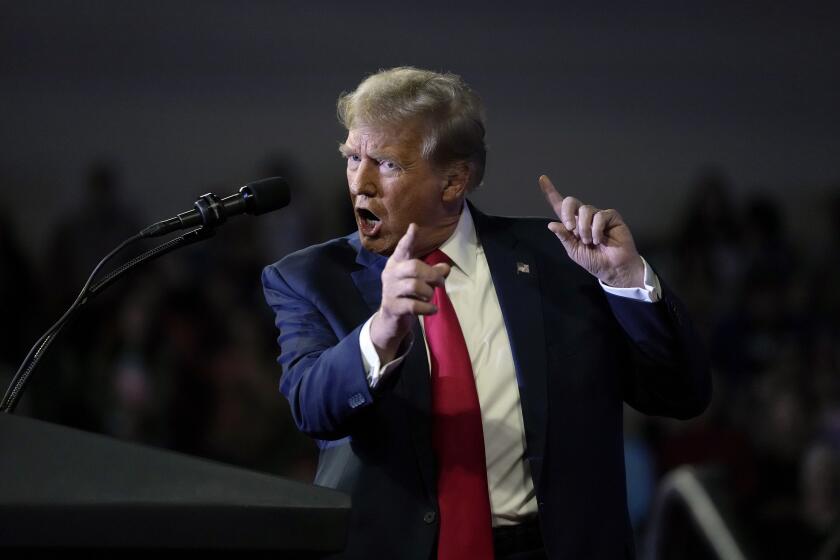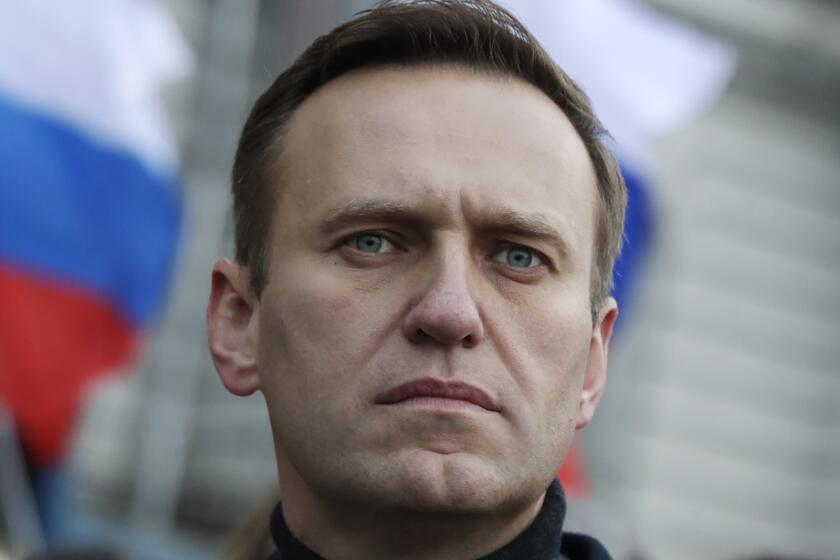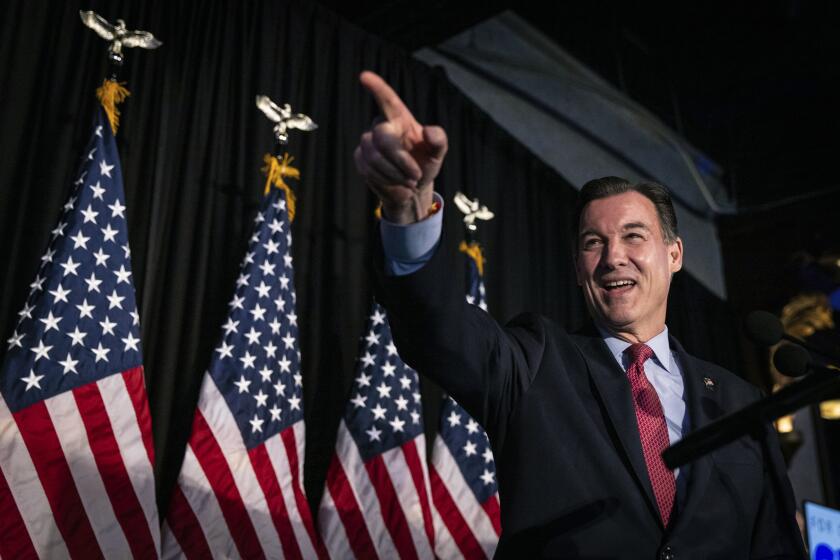Trump wanted to pull the U.S. out of NATO. In a second term, he’s more likely to try

- Share via
WASHINGTON — Former President Trump hasn’t officially won the Republican presidential nomination yet. But he’s already throwing his weight around on foreign policy — and Republicans in Congress are falling in line.
At a campaign rally this month in South Carolina, Trump said he would encourage Russia to attack U.S. allies that don’t spend enough on defense.
“No, I would not protect you,” the former president said he told European leaders. “In fact, I would encourage [Russia] to do whatever the hell they want.”
It was an extraordinary statement for a presidential candidate, and it drew rebukes from President Biden, who called it “shameful” and “un-American,” and European leaders. German Chancellor Olaf Scholz said any suggestion that the United States would not defend allies was “dangerous” and “only in Russia’s interests.”
But most Republicans in Congress excused it as just another example of Trump being Trump.
“I have zero concern,” Sen. Marco Rubio of Florida said. “He doesn’t talk like a traditional politician, and we’ve already been through this. You would think people would have figured it out by now.”
That wasn’t Trump’s only foreign policy intervention this month. He also lobbied GOP senators to block a bill containing $60 billion in aid to Ukraine and said any future aid should be limited to loans instead of grants.
Trump says he warned NATO allies as president that he ‘would encourage’ Russia ‘to do whatever the hell they want’ to members who are ‘delinquent.’
Most Republicans rolled over for that one too. Sen. Lindsey Graham of South Carolina, once a fierce supporter of Ukraine, said Trump’s opposition persuaded him to switch sides.
Trump’s positions weren’t entirely new, except for the innovation of encouraging Russia to attack U.S. allies. During his four years as president, he frequently charged that Germany and other members of the North Atlantic Treaty Organization owed the United States billions of dollars for backstopping their defense, as if they owed nonexistent “unpaid dues” or the alliance were a protection racket. He eventually focused on the more reasonable complaint that some NATO members weren’t living up to the alliance’s defense spending targets — but he still told aides that he wanted to pull the United States out of NATO completely.
He repeatedly praised Vladimir Putin — and still does; earlier this month, he lauded the Russian president as “very smart, very sharp.” As of Sunday, Trump was silent about the death in an Arctic prison colony of Russian opposition leader Alexei Navalny, except for a cryptic social media post suggesting that he has been persecuted by Biden just as Navalny was persecuted by Putin. And he has frequently expressed hostility toward Ukraine.
Alexei Navalny, Russia’s best-known opposition figure, has died in a prison colony, authorities say. Biden and other Western leaders blame Putin.
Here’s what’s different this time: In Trump’s first term, Republicans in Congress and his own foreign policy aides talked him out of acting on most of those impulses. If he wins a second term, those restraining forces will be mostly gone.
The former president has said he intends to fill a second Trump administration with MAGA loyalists instead of the establishment figures like Defense Secretary James N. Mattis and Secretary of State Rex Tillerson who populated his first term.
“When I went there [to the White House], I didn’t know a lot of people; I had to rely on, in some cases, RINOs,” Trump said last year, referring to “Republicans in Name Only.” “But I know them all now. I know the good ones. I know the bad ones.”
Congress will be different too. Since Trump was elected in 2016, dozens of establishment Republicans in the House and Senate have retired or lost their seats to pro-Trump candidates. Others will leave at the end of their current terms.
A New York Democrat’s election victory will accelerate the party’s shift toward tougher border enforcement. That’s unsettling for many California Democrats.
Sen. Mitt Romney of Utah, a frequent Trump critic, is giving up his seat at the end of the year. Republican leader Mitch McConnell of Kentucky, whom Trump has derided, says he plans to stay in the Senate, but he is likely to face a challenge for his leadership post.
Others, like Graham and Rubio, both of whom once criticized Trump, have trimmed their sails to avoid clashing with him. Last year, Rubio co-authored a law that prohibits a president from pulling the United States out of NATO without approval from Congress — but that won’t prevent Trump from undercutting the alliance by saying he won’t defend its members.
The cumulative result has been Trump unleashed, and a sea change in Republican foreign policy. For 60 years, from 1952 to 2012, the GOP was led by largely hawkish internationalists, from Dwight Eisenhower and Richard Nixon to Ronald Reagan and Romney.
Trump’s foreign policy instincts represent a different strain — xenophobic, suspicious of alliances, unilateralist on some issues and isolationist on others — that has taken root among Republican voters.
Last year, a survey sponsored by the Chicago Council on Global Affairs reported that most Republicans want the United States to “stay out of world affairs” instead of being actively involved. That was a striking reversal from earlier decades. As recently as 2017, the first year of Trump’s presidency, 70% of Republicans said they favored an assertive U.S. foreign policy. By last year, that number had fallen to 47%.
In the same poll, only 40% of Republicans favored military aid for Ukraine, compared with 76% of Democrats. Unsurprisingly, opposition was strongest among the voters most attached to Trump.
Old-school internationalists in both parties warn that the consequences of a second, less-restrained Trump term would be dire.
“If Trump is reelected, adversaries will be emboldened, and allies will be frightened,” said Kori Schake of the conservative American Enterprise Institute, who worked in the George W. Bush administration. “Allies are likely to make compromises with Russia, China, Iran and North Korea because they won’t trust us.”
“We spend hundreds of billions of dollars [on defense] to establish the credibility of our extended deterrence,” said Joseph S. Nye Jr., a former dean of Harvard Kennedy School who worked in the Clinton administration. “Trump creates doubts … that undercut those investments.”
Or take it from someone who worked at Trump’s side during the first term: his erstwhile national security advisor John Bolton.
“The damage he did in his first term was reparable,” Bolton said recently. “The damage in the second term would be irreparable.”
After Biden won the 2020 election, he tried to assure U.S. allies that the four-year Trump era was a temporary anomaly.
“America is back,” Biden proclaimed.
If Trump wins a second term, the message will be: No, it’s not.
More to Read
Get the L.A. Times Politics newsletter
Deeply reported insights into legislation, politics and policy from Sacramento, Washington and beyond. In your inbox twice per week.
You may occasionally receive promotional content from the Los Angeles Times.











